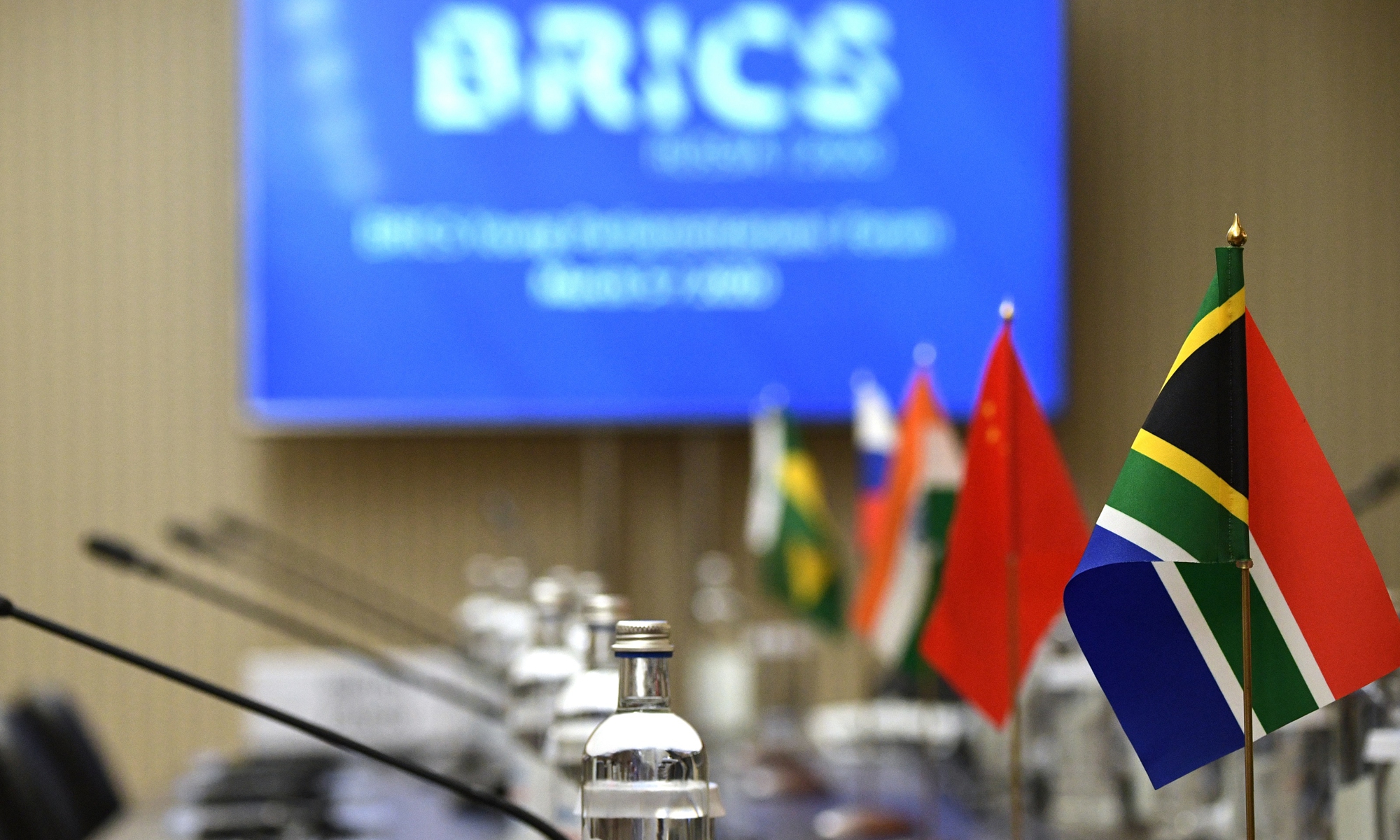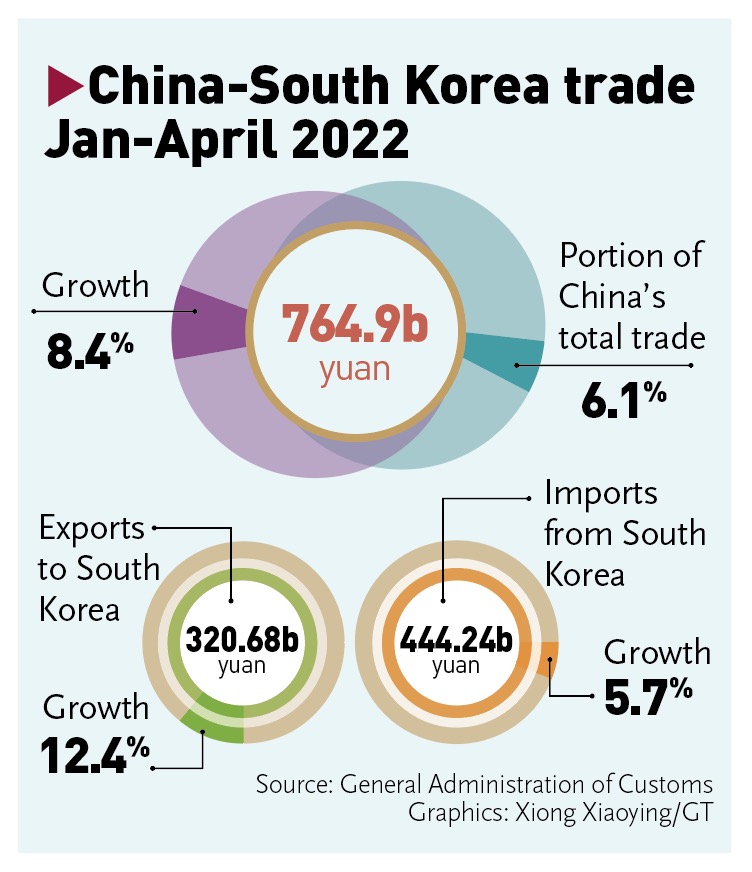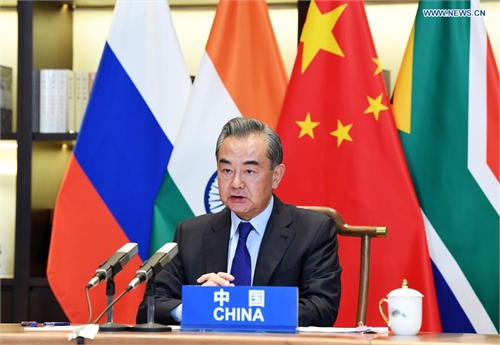BRICS urged to boost national currency settlements to counter US’ abuse of dollar hegemony

BRICS Photo: brics-russia2020.ru
As foreign ministers of the BRICS countries (Brazil, Russia, India, China and South Africa) were set to meet via video link on Thursday, Chinese experts called on the countries to work jointly to counter the US' increasingly reckless abuses of its dollar hegemony that hurt the bloc and the broader developing world.Chinese State Councilor and Foreign Minister Wang Yi would host the meeting with his counterparts from the bloc, during which BRICS foreign ministers will also have a dialogue with foreign ministers of emerging markets and developing countries, China's Foreign Ministry announced.
The dialogue is expected to further enhance solidarity, build consensus, and give emerging markets and developing countries a bigger say in global governance so as to better safeguard common interests, the ministry said.
Experts noted that it is necessary for BRICS countries to enhance trade ties and reduce dependence on the US-dominated payments system due to the US' abuse of dollar hegemony.

China-South Korea trade Jan-April 2022 Graphics: Xiong Xiaoying/GT
There has been an ongoing discussion within the BRICS to accelerate national-currency settlements, and the need is becoming urgent after the US cut Russia off from the global financial system and forced other countries to pay for its economic problems with monetary policy tightening.
Cao Yuanzheng, chairman of BOC International Research, told the Global Times on Thursday that it is necessary to increase the volume of settlements in national currencies in order to be more independent from Washington's policies, and BRICS members have been ramping up efforts to build up their financial infrastructure to speed up the progress.
"The international transactions and financial markets, which are dominated by the US dollar, have shown growing internal contradictions as Washington's policies treat its domestic needs as the first goal instead of international needs," Cao noted, pointing to recent rate hikes by the US Federal Reserve to combat domestic inflation, which hit a four-decade high.
Moreover, the US and its allies' sanctions on Russia by freezing the country's $300 billion in gold and foreign exchange reserves, accounting for nearly half of Russia's total foreign exchange reserves, have made the US dollar lose its neutrality, which will naturally prompt BRICS countries to discuss precautions, according to Cao.
Due to the anti-globalization strategy of the US, BRICS countries have been discussing about building a de-dollarized global payment and settlement system, Chen Jia, a research fellow at the International Monetary Institute of Renmin University of China, told the Global Times on Thursday, adding that the trend is being accelerated by the escalating sanctions on Russia imposed by the US and Europe.
"If the BRICS countries and even other countries intend to speed up the de-dollarization process, it will greatly enhance the status of the yuan in international settlements, and it will also be a milestone in the yuan's internationalization," Chen said.
According to the BRICS 2021 Economic Bulletin, BRICS nations account for 41 percent of the global population, 24 percent of global GDP and 16 percent of global trade.
Given the large economic size, the process of promoting settlements in national currencies is set to bring new opportunities for the yuan, as the Chinese currency has been gaining momentum in internationalization over recent years, Cao noted.
"Judging from the current trend, the yuan is basically popular in countries and regions along the routes of the Belt and Road Initiative. If the BRICS countries can reach a consensus, they can speed up the use of the yuan in a certain region," Cao added.
However, experts acknowledged that it would take a long time and combined efforts of the BRICS to chip away at the dollar's dominance backed by its comprehensive national strength, and the process could risk retaliation and long-arm jurisdiction from the US.
Whether yuan settlements can be accepted by other countries or not depends on their confidence in China's development and whether they can share the benefits of China's economic growth by holding yuan assets, Tian Yun, former vice director of the Beijing Economic Operation Association, told the Global Times on Thursday.
"Therefore, if we do a good job in industrial upgrading and enhancing competitiveness in the international market, the internationalization of the yuan will be further deepened. We should also make efforts in the construction of relevant financial infrastructure and support systems to make the yuan easier to obtain and circulate," Tian said.
In parallel to the SWIFT global banking messaging system, China has developed the country's own trade settlement system called the Cross-border Interbank Payment System (CIPS), which offers clearing and settlement services for participants in cross-border yuan payments and trade.
In 2021, CIPS handled more than 3.3 million transactions, up by over 50 percent from 2020, and it processed roughly 80 trillion yuan ($12.56 trillion) worth of transactions, a surge of over 75 percent from 2020, according to media reports.
As China further steps up efforts to promote the internationalization of the yuan and become more open to the global economy, the Chinese currency is expected to play a rising role in global payments, settlements and foreign exchange reserves over the long term, Zhou Maohua, a macroeconomic analyst at Everbright Bank, told the Global Times on Thursday.
In April, the yuan retained its position as the fifth most active currency for global payments by value, with a share of 2.14 percent, behind the US dollar, the euro, the pound and the yen.



